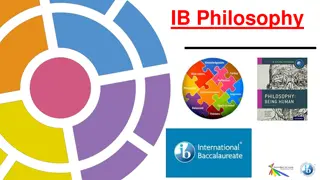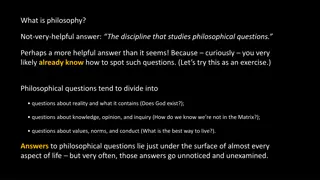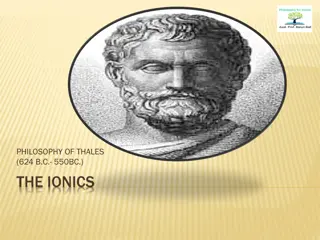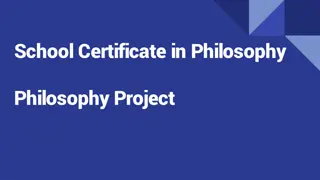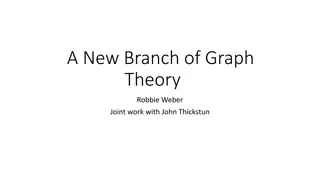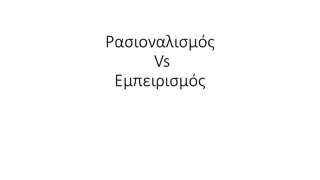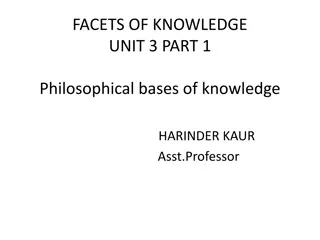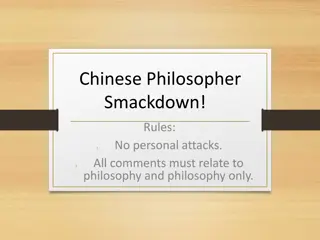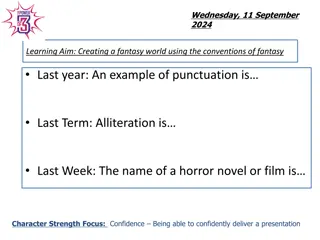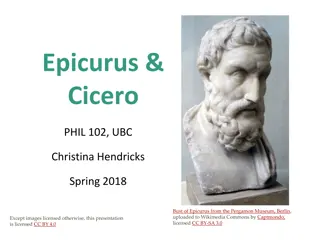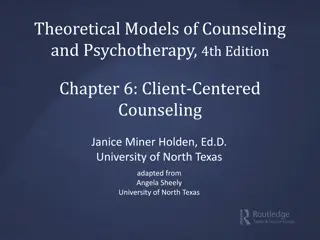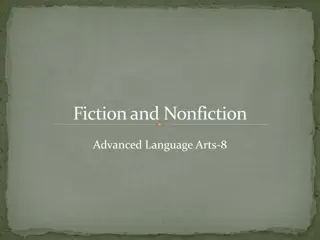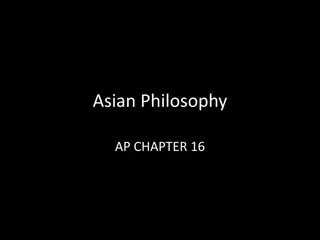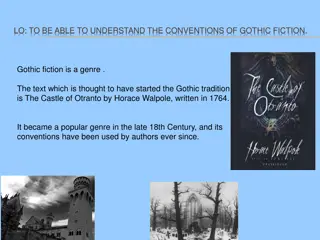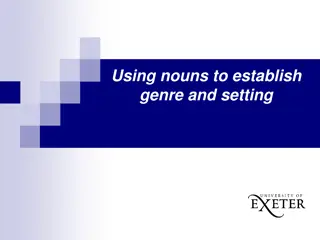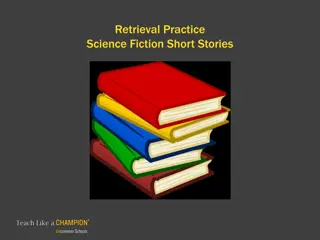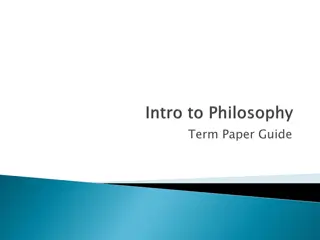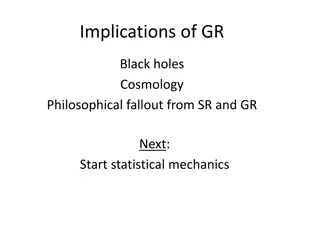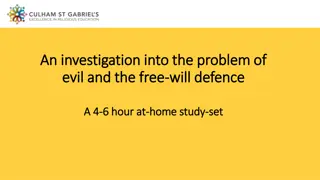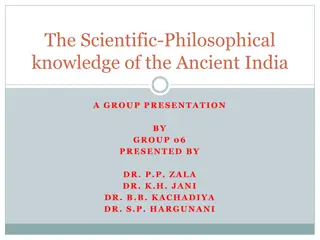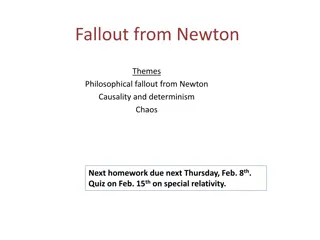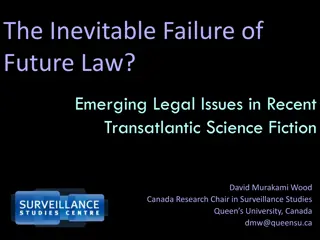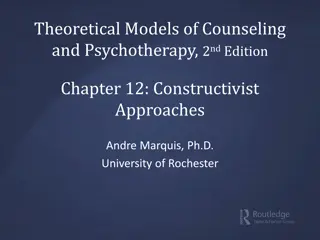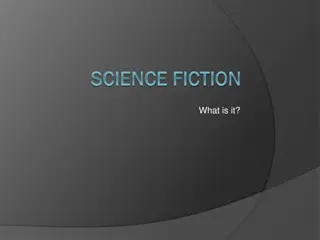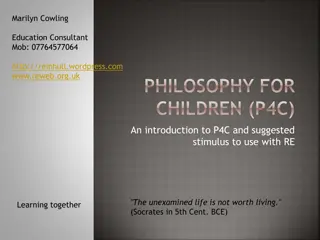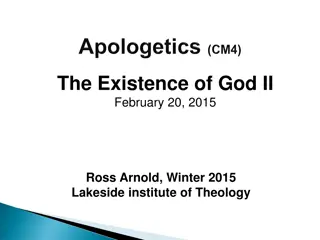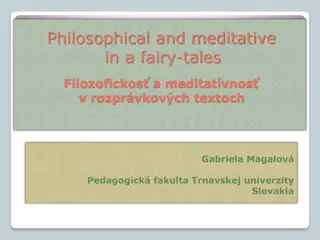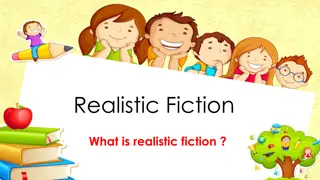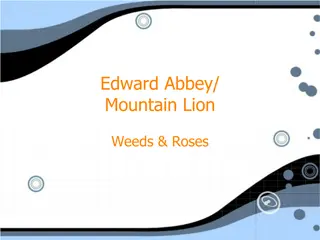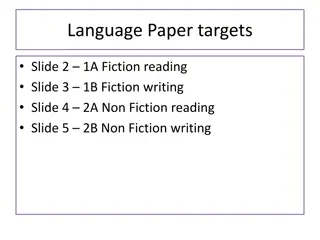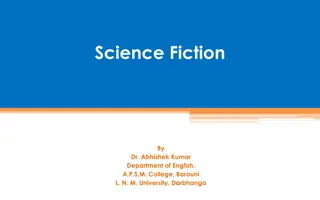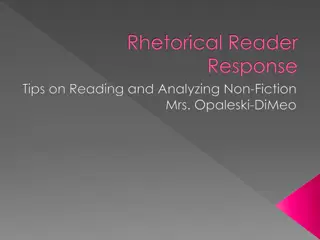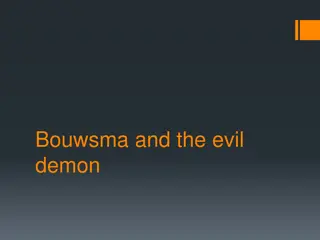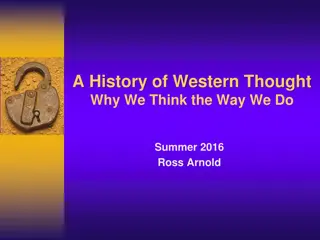Exploring Citizen Journalism and Non-Fiction Writing
Explore the world of citizen journalism and non-fiction writing, learning about text types, adapting writing to conventions, considering audience, purpose, and tone. Discover the significance and usefulness of non-fiction writing, and delve into creating various text types. Uncover the role of citiz
1 views • 11 slides
Exploring the World of Sociology through Philosophy
This philosophy course delves into engaging with influential thinkers, encouraging students to actively participate in philosophical activities. Covering topics on being human, ethics, religion, philosophical texts, and contemporary issues, it also emphasizes internal assessments and stimulating int
2 views • 15 slides
Understanding Philosophy: A Guide to Philosophical Questions and Debate
Philosophy delves into questions about reality, ethics, and knowledge. Studying philosophy involves constructing logical arguments to explore and understand these fundamental inquiries deeply. As a student, you'll develop critical thinking skills to engage in philosophical discussions and analyze di
0 views • 5 slides
Philosophy of Thales: The Ancient Wisdom of the Ionic School
Thales of Miletus, a key figure in the Ionic School of philosophy, is considered the father of philosophy. He believed that water was the principle of all things and made significant contributions to mathematics and astronomy. Thales's wisdom and engineering feats, such as diverting the river Halys,
0 views • 18 slides
Exploring Historical Fiction: Elements and Examples
Discover the essence of historical fiction, its key elements, and examples like "Forrest Gump." Learn how plausibility and interpretation play pivotal roles in creating captivating narratives that blend fiction with historical events.
0 views • 11 slides
Philosophy Project: Exploring Ideas, Debates, and Research
Dive into the world of philosophy by embarking on a project that involves exploring philosophical ideas, engaging in debates, conducting research, presenting arguments, and drawing conclusions. Develop critical thinking skills and delve into thought-provoking questions. Choose a topic, conduct thoro
0 views • 8 slides
Exploring Deep Graph Theory: Philosophical Implications and Misconceptions
Delve into the realm of Deep Graph Theory where graph theory statements are analyzed beyond their conventional scope to uncover philosophical insights and correct misunderstandings. Discover the essence of trees, forests, and the unique relationship where every tree is regarded as a forest. Addition
0 views • 13 slides
Philosophical Reflections on Knowledge and Reality
The content delves into philosophical musings from renowned thinkers like Descartes, Leibniz, and Spinoza, exploring concepts such as innate ideas, geometrical truths, and the nature of philosophy itself. Through their writings, we reflect on the origins of knowledge, the interplay of sensory experi
1 views • 22 slides
Facets of Knowledge: Exploring Philosophical Bases and Types
Delve into the philosophical foundations and types of knowledge with insights on local and universal knowledge, theoretical and practical aspects, and school versus out-of-school knowledge. Understand how facets contribute to extended knowledge about attributes within different frames.
0 views • 10 slides
Chinese Philosopher Smackdown: Deep Dive into Philosophical Quotes
Explore a riveting discussion on various philosophical quotes with insightful interpretations and connections made by participants. Delve into the essence of government, society, power, wisdom, responsibility, and more through thought-provoking reflections on renowned philosophical statements.
2 views • 14 slides
The Trial and Death of Socrates in Ancient Athens
The trial and execution of Socrates in ancient Athens sheds light on the complexities of Athenian democracy and the philosophical controversies surrounding Socrates' questioning methods. Socrates' relentless pursuit of truth and virtue led to his condemnation by the democratic system he lived in. Pu
1 views • 13 slides
The Grim Reaper Paradox: A Metaphysical Inquiry into Time and Causation
Exploring the intriguing Grim Reaper paradox and its implications on the necessity of finitude in time and causation, this content delves into various philosophical arguments surrounding the concept of infinity and the nature of existence. Through detailed analyses of different paradoxes and argumen
0 views • 33 slides
Exploring Philosophy in Schools: A Comprehensive Overview
Delve into the educational and philosophical aims of teaching Philosophy in schools, understanding the inquiry process, weaving networks of ideas, and tackling philosophical incongruence and inadequacy through reflective judgments. Explore how philosophical problems arise when ideas don't align and
0 views • 28 slides
Exploring Fantasy Worlds: Conventions, Types, and Challenges
Dive into the realm of fantasy literature and learn about the conventions, types, and differences between fantasy and sci-fi. Uncover the definition of fantasy, explore popular genres, and discover sub-genres like fiction, science fiction, and historical fiction. Engage in thought-provoking challeng
0 views • 17 slides
Philosophy in Ancient Greece: Epicurus and Cicero
Explore the philosophical ideas of Epicurus and Cicero, key figures in ancient Greek and Roman philosophy. Learn about Epicurus' emphasis on empiricism, his views on the nature of the universe, and his concepts on gods and the soul. Delve into Cicero's dialogues and philosophical perspectives preval
0 views • 18 slides
Washington Irving: Father of American Fiction and Pioneer of American Romanticism
Washington Irving, an influential American author of the early 19th century, is revered as the Father of American fiction. Known for iconic works like "The Legend of Sleepy Hollow" and "Rip Van Winkle," Irving played a crucial role in establishing American literature as an independent art form. His
1 views • 14 slides
Understanding Carl Rogers' Client-Centered Counseling Approach
Explore the historical overview, philosophical underpinnings, and personality development principles of Carl Rogers' client-centered counseling approach. Learn about Rogers' development of theory, his philosophical influences like phenomenology and existentialism, and key concepts such as actualizin
0 views • 23 slides
Understanding Fiction and Nonfiction in Language Arts
Fiction and nonfiction are two key genres in literature. Fiction involves imaginative storytelling with elements like plot, characters, setting, point of view, and theme. Nonfiction, on the other hand, deals with real people, events, and ideas, aiming to inform, persuade, or entertain readers. Explo
0 views • 14 slides
Understanding Confucius: Key Concepts and Philosophical Ideals
Confucius, born during the Zhou Dynasty, emphasized virtue, social reform, and humanism in his teachings. He focused on values like Ren (human-heartedness) and key concepts such as De (virtue) and Li (propriety). By studying human practices, he sought to achieve goodness and harmony. Explore the phi
0 views • 23 slides
Understanding Gothic Fiction Conventions in Literature
Gothic fiction is a captivating genre rooted in dark, mysterious settings, supernatural elements, and eerie atmospheres. Originating with "The Castle of Otranto" by Horace Walpole, this genre has evolved to encompass elements like family curses, isolated castles, and sinister creatures. Dive into th
0 views • 25 slides
Creative Noun Usage in Science Fiction Writing
Explore the art of using nouns to establish genre, setting, and character names in science fiction writing. Learn how authors like Philip Reeve utilize proper nouns to create immersive worlds and unique characters. Delve into the significance of authentic text, discussion, and purposeful learning pr
0 views • 10 slides
Science Fiction Retrieval Practice: Short Stories Insights
Explore futuristic technologies, incongruity, and speculative fiction elements in science fiction short stories like "Robbie" and "There Will Come Soft Rains." Uncover the connections to historical events, like the Cold War, through literary analysis of these captivating narratives.
0 views • 16 slides
Comprehensive Guide to Writing a Philosopher Research Term Paper
In this detailed term paper guide, learn how to write a 4-6 page paper on a philosopher's life and work. Covering biography, philosophical contributions, and citation styles such as MLA, APA, or Chicago Manual. Get step-by-step instructions on structuring your paper, including sections on introducti
0 views • 18 slides
Exploring Philosophical Implications of General Relativity: Black Holes, Cosmology, and More
Delve into the profound implications of General Relativity on topics such as black holes, cosmology, and philosophical consequences from Special and General Relativity. Discover how curved geometry allows for different topologies, potential return of preferred frames, the concept of horizons near bl
0 views • 18 slides
Exploring the Problem of Evil and Free Will Defense: A Study Set
This at-home study set delves into the philosophical question of whether the existence of evil conflicts with the existence of God, alongside the free will defense. Drawing on research by Erik J. Wielenberg, students will engage with key questions, objections, and deepen their understanding of the p
0 views • 6 slides
Ancient Indian Scientific and Philosophical Knowledge: A Remarkable Insight
Explore the profound scientific and philosophical insights of ancient India as presented by Group 06 with a focus on remarkable achievements like the velocity of light, the Big Bang theory, Vedic astronomy, and concepts such as the heliocentric solar system. Dive into ancient texts like the Rig-Veda
0 views • 22 slides
Newtonian Determinism and Philosophy: A Critical Examination
Within Newton's philosophical framework, the interplay between causality, determinism, and empiricism shapes his views on space, time, and the nature of reality. Examining his rules of reasoning and the implications of Newtonian determinism, we delve into the philosophical underpinnings of his scien
0 views • 16 slides
Exploring Legal Themes in Science Fiction: The Inevitable Failure of Future Law
This study delves into emerging legal issues in recent transatlantic science fiction works by authors like Charles Stross, Ken McLeod, and Paolo Bacigalupi. It examines the portrayal of law in SF and what insights it offers about our legal systems. Through a systematic survey of over 300 novels and
0 views • 12 slides
Constructivist Approaches in Counseling and Psychotherapy: A Philosophical Perspective
Constructivist approaches in counseling and psychotherapy emphasize the ongoing process of structuring experiences to create meaning. This perspective involves philosophical underpinnings from thinkers such as the Buddha, Immanuel Kant, and Jean Piaget, highlighting the role of individual constructi
0 views • 35 slides
Exploring the World of Science Fiction
Science fiction is a genre that delves into imagined future scientific and technological advances, exploring major societal and environmental changes, space travel, time travel, and life on other planets. It combines elements of science and fiction to create believable yet captivating narratives tha
0 views • 14 slides
Exploring Philosophy for Children: Enhancing Critical Thinking Skills
Delve into the world of Philosophy for Children (P4C) with Marilyn Cowling, an Education Consultant. Learn about the importance of asking philosophical questions, engaging in activities like diamond ranking, and fostering a love for wisdom among young minds. Discover how P4C encourages deep thinking
0 views • 28 slides
Philosophical Apologetics: Arguments for the Existence of God
Philosophical apologetics presents various arguments for the existence of God, including the ontological, cosmological, teleological, moral, transcendental, and presuppositional arguments. These arguments cover diverse aspects such as change, causality, design, contingency, miracles, consciousness,
0 views • 10 slides
Exploring the Meditative Fairy Tales: A Philosophical Perspective
Delve into the realm of meditative fairy tales, a concept not widely recognized in literary theory but significant in conveying deeper messages to both children and adult readers. This exploration touches on the intertwining of the fabulous genre with profound connotations, highlighting the nuanced
0 views • 10 slides
Understanding Realistic Fiction: Features and Examples
Realistic fiction is a genre of writing that portrays characters, settings, and events that could exist in real life, even though the story itself may be fictional. The key features include believable characters, realistic settings, everyday problems, and plausible solutions. By sorting book covers
0 views • 9 slides
Analyzing Edward Abbey's Mountain Lion, Weeds, and Roses
Abbey's essay on encountering a mountain lion is analyzed for its use of shifts, transitions, and philosophical reflections. Feedback is given on areas of improvement such as making solid transitions, enhancing introductions, and improving thoroughness. The essay's structure, use of transitions, and
0 views • 27 slides
Language Paper Targets for Fiction and Non-Fiction Reading and Writing
This content provides detailed targets for Language Papers, focusing on Fiction and Non-Fiction reading and writing skills. It covers strategies such as being specific in analysis, using evidence from texts, improving sentence structures, enhancing vocabulary usage, and applying language techniques
0 views • 14 slides
Evolution of Science Fiction Literature
Science fiction genre, blending imaginative fantasy with scientific principles, has evolved significantly over time. Initially emerging in the late 1800s, it gained popularity alongside technological advancements. Theodore Sturgeon highlighted the essence of human stories within the genre. Iconic wo
0 views • 8 slides
Effective College Reading and Analysis Strategies for Non-Fiction Texts
Enhance your non-fiction reading and analysis skills with these practical tips: prepare yourself mentally before reading, preview the article, highlight key points while reading, monitor comprehension, and summarize the article afterward. Additionally, learn how to create a rhetorical précis to eff
0 views • 19 slides
Understanding Illusions and Reality in Philosophical Thought
Explore Bouwsma's philosophical insights on illusions and reality through scenarios involving an evil demon and a deceptive world. Learn how individuals can distinguish between illusion and reality in thought experiments involving deception and perception.
0 views • 28 slides
Evolution of Western Philosophical Thought: From Idealism to Humanism
Explore the rich history of Western philosophical thought from the idealism of Plato to the humanism of Whitehead. Trace the progression of thought, including materialism, rationalism, skepticism, and relativism, as key thinkers like Descartes, Kant, Marx, and others shaped our understanding of real
0 views • 16 slides

